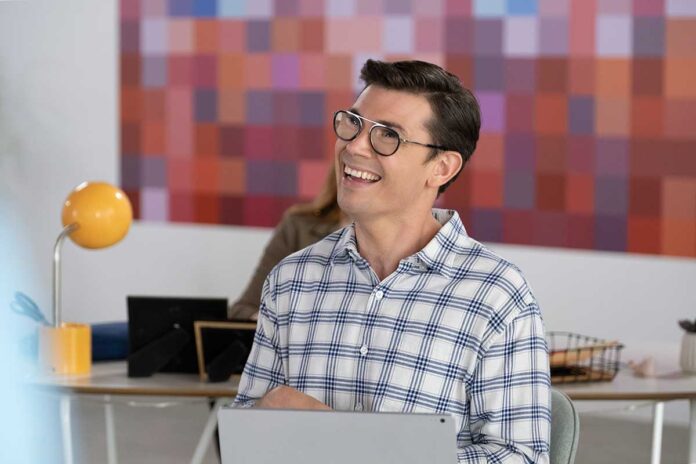A gay man with cerebral palsy. You won’t find that kind of important representation just any time you flick on the TV, which is why Ryan O’Connell’s Netflix show “Special” has been uniquely refreshing and profoundly revolutionary.
It began as a memoir — his memoir, entitled “I’m Special: And Other Lies We Tell Ourselves” — and then evolved into a full-fledged, semi-autobiographical dramedy in 2019 on Netflix. He created it, he stars in it, he writes it. And he does so once again with the second and final season, which expands episodes from short bits to sitcom-length servings, with openly gay actor Jim Parsons still producing. During this season, which premiered May 20, lead character Ryan (the actor, who is gay and living with cerebral palsy himself, shares his name with the title character) continues his journey to self-fulfillment. That path is lined with hiccups involving an open relationship, topping, and his relationship with his mother.
Here, O’Connell talks about his honest approach to gay sex (and why he thinks most gay sex on TV is “dire”), deciding to incorporate a storyline on the, uh, shitty part of butt play and how it’s important for him to still, after “Special,” create stories about people living with disabilities.
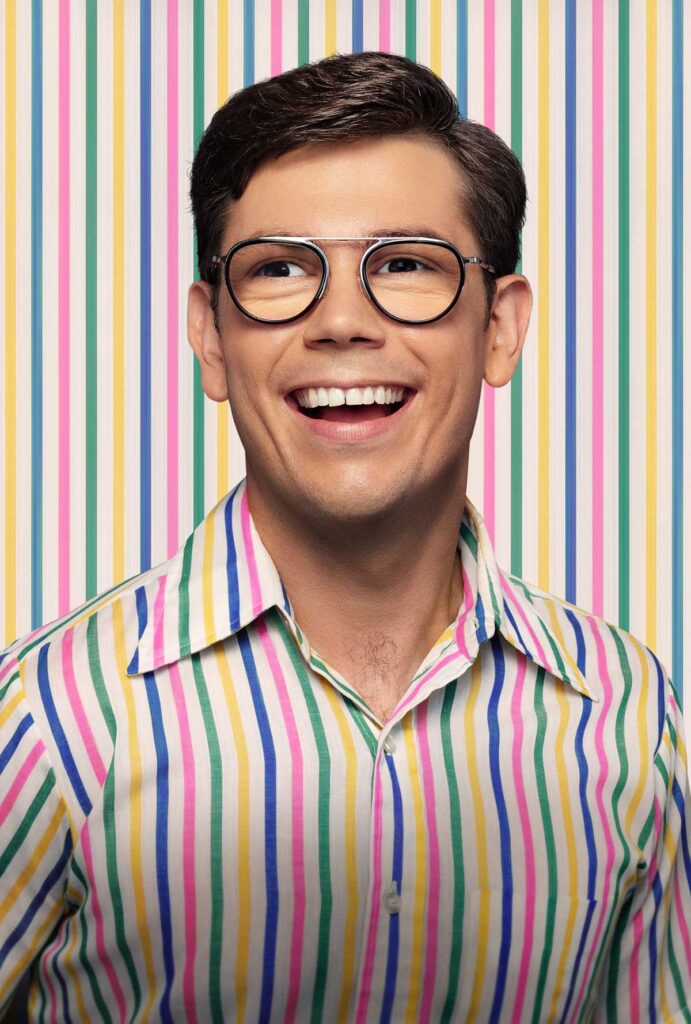
I’m gonna miss TV Ryan.
Oh, I know, I know. It’s a bummer. But, uh, at least you get more time with him for Season 2, right?
How’re you feeling now that the show has come to an end?
Honestly, it sounds weird to say, but I feel pretty good about it. I mean, obviously, the decision to end the show was not mine, but here’s the deal: I’m gonna give you a little blurry timeline of the show. We pitched it in 2015; it took four years to get made. Then it came out April 2019 and took us five months to get renewed and then COVID shut us down. (It took) us two years for Season 2.

So, as amazing as the show has been, and incredible, it’s also kinda been like a bad boyfriend. This has been a part of my life for six years, so because we knew from the jump that this was going to be the last season, we were able to really craft, I think, a really complete and final season. So from the storyline perspective, it feels totally right. “Special” has been really incredible, but it’s been a really, really difficult show to make and it feels like it’s always hanging on by a thread and, yeah, I think I’m ready (laughs) for a new anxiety moment.
Difficult in the sense of you being so involved in every aspect of the show or…?
Well, no. That I love ’cause I’m a Type A Virgo from hell, so that’s where I thrive. I refused to do 15 minutes again, so we had to do a whole new deal, blah, blah, blah, blah, blah. Everything was really protracted and it’s been a journey with the show, man. She has not been easy!
Listen, boyfriends are work too.
They (are), and they give you amazing orgasms sometimes.
So what you’re saying is the payoff was worth it in the end?
The payoff was totally worth it.
With this season, where do you end and where does the other Ryan begin?
As the show’s gone on, the character of Ryan has become less and less like me, especially in Season 2. Season 1, honestly, wasn’t really like me either (laughs). I mean, I was never like this character; I was never this arrested development. I moved out of my parents’ house at 18 — right on schedule! Lost my virginity at 17 — right on schedule! What I do relate to with this character of Ryan in Seasons 1 and 2 are the emotional themes, like what he’s struggling with, this feeling of, “Is he enough?” This struggle with self-worth and independence. That really resonates with me deeply. But in terms of the situations this little goof troop finds himself in, I don’t relate to that.
Like, I would never date someone in an open relash who has all these convoluted rules and be like, “Sure, I can see you Tuesday evening and I’m totally OK with that.” I mean, maybe I would’ve, honestly. I would have done that in my early 20s. But the situation never presented itself to me. But emotionally I get it. I’ve been through what he’s been through.
I’m calling this season “Ryan’s journey to being a dom top.”
Oh my. Well, at least emotionally, yeah. And actually, you’re right, he does top! Oh my god, you’re right! (Laughs.)
How could you have forgotten?
The metaphor is very thinly veiled, I would say. “Very” thinly veiled.
And I’m just obviously being as literal as possible.
Well, I think it works both ways, baby. I think Ryan has been emotionally and physically bottoming for a lot of people and this season is all about him coming into his own and asserting what he wants and not apologizing for it. He’s not apologizing for taking up space; that’s something I really, really relate to.
A couple years ago, I really experienced a shift in terms of realizing how much I was contorting myself to make everyone else around me comfortable while never asking, “Am I comfortable? Do I want to do this?” And then I would see straight, white males waltz around the world with such confidence, engaging their female baristas in non-consensual conversations about their band and my blood would boil because I’d just be like, I can’t imagine going into an interaction not fully wondering what the other person is feeling and taking their feelings into account. I feel like I’m so hyper aware of how I’m being perceived and making sure that everyone else around me is OK with who I am. But I really have learned to let go of that completely and I just try to walk around with the confidence of a New York straight, white male. I cosplay as one every day. Not at the coffee shop, though. I leave those baristas alone. They don’t need any of this, they don’t.
They’re getting enough on their own.
Exactly, exactly. They don’t need to hear about my day, I can tell you that right now.
It sounds like you had a past as a barista…
No! As if I could carry anything, are you kidding me? A barista is a guy with cerebral palsy’s worst nightmare. It’s like all the things he can’t do: hand-eye coordination, like balancing. Oh my god, I would be fired immediately. It would be a lawsuit waiting to happen.
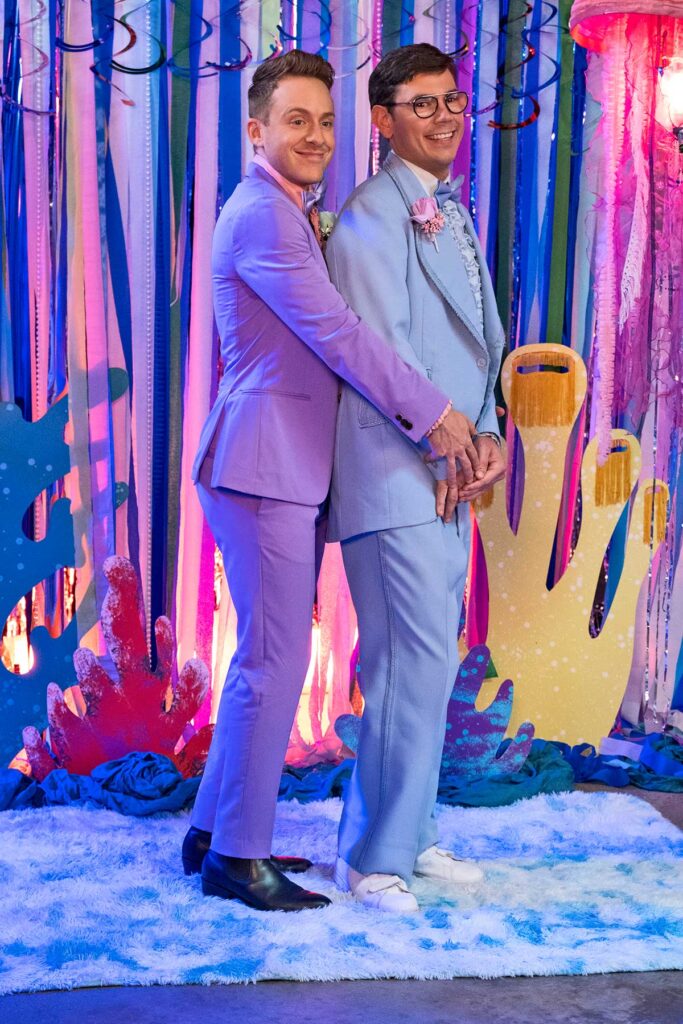
As for the gay sex on “Special”: It’s not the kind of gay sex that’s watered down to make straight people more comfortable, which is why I love it so much.
Yes, it’s definitely… you can tell it’s written and performed by a gay person. And also, I’ve been very vocal about how I only hire gay actors to play gay roles and people are like, “Um, it’s called acting, ever heard of it? That’s their literal job.” And I’m like, “Honey, sweetie, darling, baby, that’s not what this is about. I understand, I’m very aware of what acting means, but we don’t live in a world where there’s an equal playing field and that’s why I wanna give people opportunities to get parts, because not a lot of people are giving them those opportunities.” And also, from a selfish point of view, it’s much easier to shoot a gay sex scene with a gay actor than it is a straight actor. I don’t wanna fucking explain the mechanics of gay sex to a straight actor. Life is too short, honey.
Somebody had to say it.
Yeah. But we definitely pushed the envelope. And then we cum all over it for Season 2 in terms of sex. Sex is my muse, for better or for worse. I just don’t understand why the representation of gay sex has been so dire. It’s either hypersexualized and very porny and erotic, or it’s done in a tent, off-camera, and you just hear lots of grunting and moaning.
So it was really nice to “not” do any of that and also not have sex that’s cloaked in shame or secrecy. I’m not saying that there’s not value to those stories ’cause it is a part of our existence, but I think we’ve reached a point where I’m like, “OK, I’m ready for us to level up for gay storytelling.” I’m interested now in stories that don’t revolve around our trauma and our pain, or that include our trauma and pain but also include like, you know, anal sex jokes. We contain multitudes.
Season 2 also explores the pleasures of being gay.
Which there are so many. You couldn’t pay me to be straight, it’s horrifying. So I just think it’s really, really important that we tell a different kind of story, ’cause I think we’ve earned it and I think we’re ready.
From what I know, this season was shot entirely during the pandemic, which means the sex scenes were also shot during the pandemic. Is that right?
The first four episodes were shot pre-COVID. So what I’m saying is they were real (laughs). And then COVID came along and we’re like, “Oh no, I guess we have to fake it.” Just kidding! The first four episodes “were” done pre-COVID. It’s so funny watching the first four episodes ’cause I feel like I have a literal record of the last month of the world before it changed aerobically forever. It’s so eerie. But again, with me and Max Jenkins, Max is a friend of mine and I’ve known him for a long time and there’s just a level of comfort between the two of us that, again, is another benefit of just shooting with gay friends. There’s this ease that I feel I wouldn’t have with some rando straight stranger. So I don’t feel like the pandemic actually made the sex scenes suffer. And I know that some people were cutting sex scenes throughout the pandemic, and I was like, “This is the DNA of the show.” Like, I can’t. I was like, “I will die on this literal sex hill.” Truly. Like, literally die. When we talk about dying for your art, I didn’t realize I was going to be really metabolizing that in a literal sense for block two of shooting, but here we were, baby, here we were.
And those sex scenes, even for gay actors, are still pretty choreographed, right?
Yeah, it is. Again, when you’re doing it with another gay guy, it’s pretty intuitive and very easy to construct because we’ve all done it and we’ve all been there. It’s not like “Building a Mystery” by Sarah McLachlan.
On the topic of sex, I want to say that I really appreciate the storyline involving anal sex and poop.
Oh my god, I know. Why has no one talked about that? That’s crazy.
Well, this is why we’re gonna talk about it. I want to know everything about that bit in the show, and mostly why you decided to write a storyline involving the part of butt sex so few gay men talk about.
Well, because it happened to me when I was 17, losing my virginity: I shit on my boyfriend-at-the-time’s dick and, again, there was no reference point for anal sex in 2004. There just wasn’t anything; there was no Netflix series tackling it (laughs) with care. So you kind of had to wing it. And, uh, anal sex was really intense!
I remember the first few times we tried fucking, it hurt too bad ’cause I don’t think we even realized lube was a thing. I mean, it was all very weird, it was a DIY affair. Then, finally, when I did my emotional exercises and was ready to do it, then that’s when I had the accident and I remember thinking, “Oh my god, is my asshole broken? Is this like a cerebral palsy thing? Like, what the fuck is going on?”
I remember Googling — or I don’t even know if there was Google, but whatever it was in 2004 — “Anal. Shit. Sex.” Nothing really came up. So I remember feeling a lot of shame about that, and I didn’t know about douching or anything like that so whenever I have to go through something and suffer, I’m always like, “Wow, this is a nice opportunity for someone who is a teenager who may be thinking about having anal sex for the first time to know that this does happen.” Shit happens, literally. And you’re not freakish, your asshole is not broken. Honey, it’s a part of the fabric of our gay ass lives.
And in the show, you take the shame out of it, which is great.
Yeah, I actually just thought it was an interesting kind of turn for Tanner (Jenkins) to have the sexual misstep, as it were, and have Ryan not respond in a kind of chic, compassionate way, because Tanner’s been kind of compassionate with him and anytime that Ryan kind of acts in an uninvolved way is very interesting to me. I’m a big advocate that marginalized people exist, but they can also exist as very flawed and not always doing the right thing, ’cause I think, again, we’re given this tiny space to exist but we better be virtuous and be magical and wonderful. And so I thought it was an interesting way to make Ryan sort of the asshole, as it were, in the sexual experience with Tanner. I thought it was just an interesting little wrinkle for their doomed relationship.
Something that I have also never seen on TV: the guy who you meet who fetishisizes disability. Were you faced with a situation like that in your own life?
I’ve never been fetishized, but I’ve heard about it and I know that it’s a thing. I think they’re called “devotees,” and I thought it was an interesting way to explore Ryan grappling with his self-worth. So it was really important to me that it was very clear that this is a consensual experience. Ryan’s not being sexually assaulted. The guy says, “Is this OK?” and Ryan says yes because that’s a very real thing that we don’t talk about, which is basically sex that you’re not comfortable having but you don’t necessarily have the self-esteem to MacGyver yourself out of it.
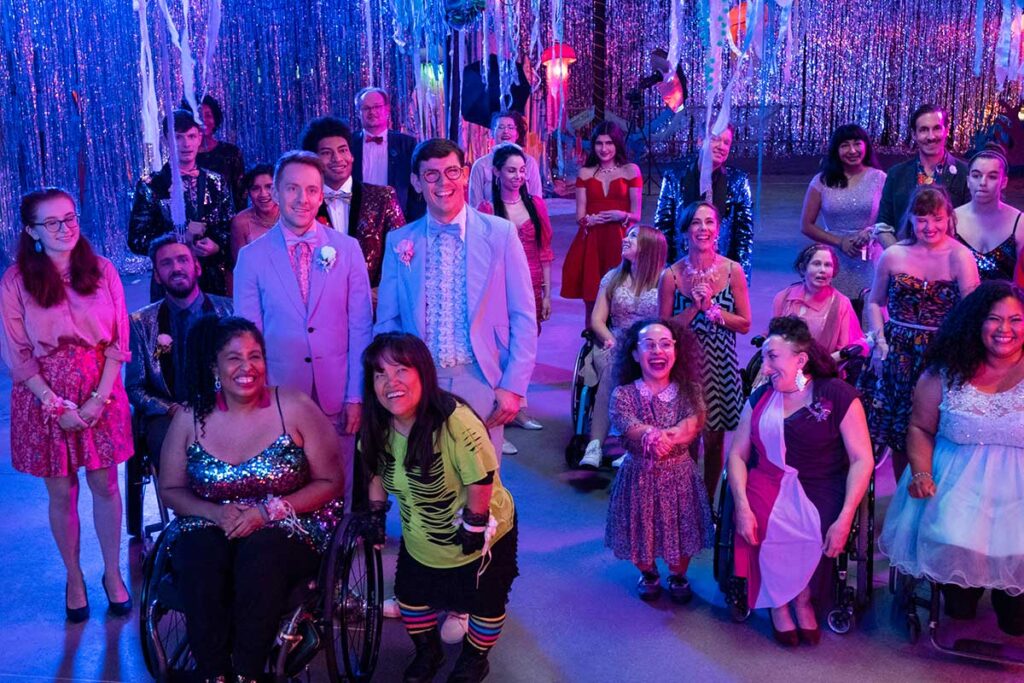
How do you hope “Special” has enlightened people within the LGTBQ+ community, and beyond, who haven’t really considered the experiences of someone who is a queer person with a disability?
I hate the word “normal,” ’cause what is normal? But so little is discussed in terms of disability. I feel like disabled people often exist on the fringes of our society because they are quite literally shut out, based on this world not being accessible on a very basic level. So I think that the dialogue around disability is happening, but I still think it’s not happening to the level that it should and I think people feel uncomfortable when talking about disability. I feel like they’re worried about saying the wrong thing. I think with “Special,” you know, comedy is the best superpower that I have, that I’ve used throughout my life to get through it. And I think that when you give people permission to laugh, it creates this general ease and comfort.
Ryan is disabled, but you don’t have to be disabled to be feeling the things that he’s feeling. So I think it’s really just important to show a gay character who doesn’t fit the physical ideals. I hope that it normalizes disability and I hope that it adds more texture to the queer experience, because in a lot of ways TV is gayer than ever. I feel like you can’t sell a pilot without including a gay guy in there. But I still think that gay men are rarely allowed to be the complicated main course of the show. I think they’re often relegated to being the appetizer. So I think it’s really important that we show gay men and (their) rich interior life, not just in the context of them, like, shopping or being comedic relief.
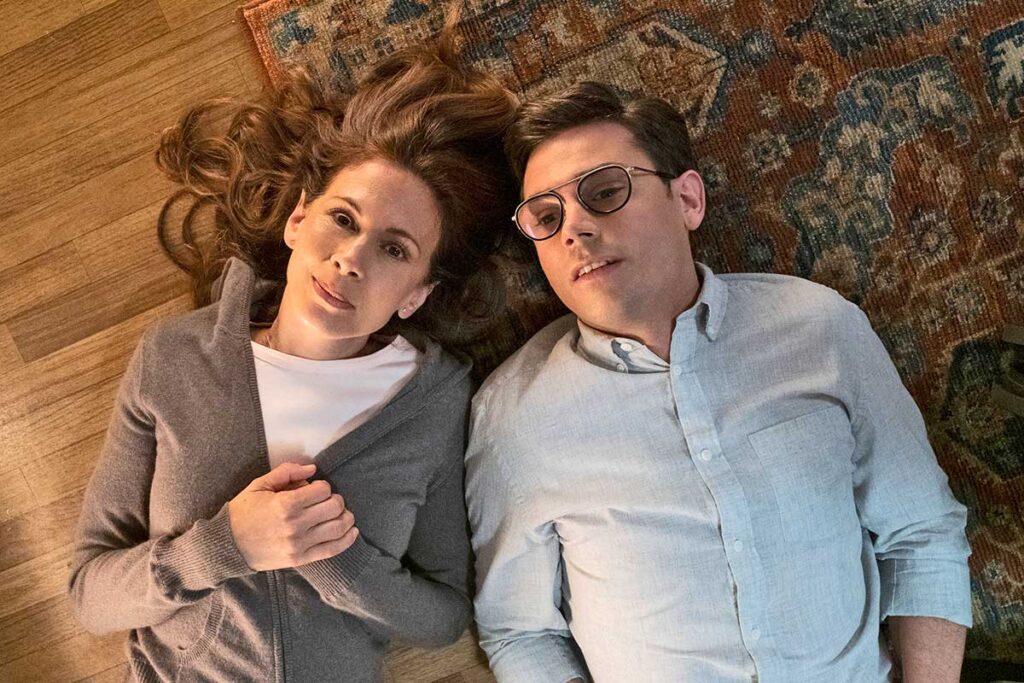
Totally, which is what you do. You accomplish that in Season 2 with Ryan. There’s moments when he’s not particularly likable.
We’re not all likable. I just feel like TV exists in this really binary way where it’s either someone is really virtuous or amazing, or they’re a fucking asshole. People aren’t total assholes, and they’re not totally amazing. They exist in between, and I think that’s always what I try to show with Ryan and other characters: that, yes, they can act deeply flawed, but they can also be incredible.
Looking ahead, what kind of stories do you want to tell next or be a part of? And in what form: film or television?
Picasso had his Blue Period, and I’m still in my Gay Disabled Period. So, I wrote a novel called “Just By Looking At Him” that is about a gay guy with cerebral palsy who writes for TV. What?! She didn’t stray too far for this one! That’s being adapted into a movie with Greg Berlanti producing, so I’m gonna be writing that and starring in it, which will be really great. Then I sold a show to HBO Max called “Accessible,” which is a teen disabled comedy, which I hope gets picked up to series.
Sometimes I feel like, “Should I really kind of dive into disability again?” or “I’ve already done that,” but the fact is that there’s so much that has not been explored and that’s what really gets me excited as a storyteller: when you can say things like, “Wow, I’ve never seen that on TV before.”
It’s crazy that we’re still saying that in 2021. Even though there are approximately 40 million shows on the air, there are things that still have stigma and still have taboo. So I’m only going to be playing in the world of disability for a little bit longer! And we’ll see what happens.
Chris Azzopardi is the Editorial Director of Pride Source Media Group and Q Syndicate, the national LGBTQ wire service. He has interviewed a multitude of superstars, including Cher, Meryl Streep, Mariah Carey and Beyoncé. His work has also appeared in The New York Times, Vanity Fair, GQ and Billboard. Reach him via Twitter @chrisazzopardi.
